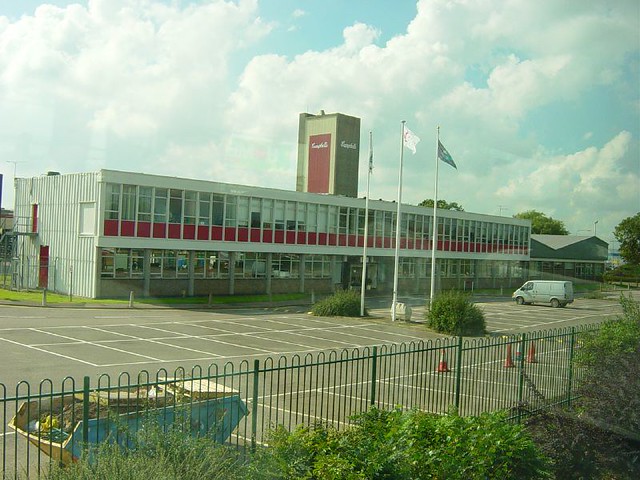
Although its branding as a tower seems rather euphamistic when viewed in the immediate robust, industrial context, in this low-lying part of the British Isles it stood as a landmark visible from the Fens and beyond. Architecturally there was an interesting, and possibly entirely subconscious play between postmodern boasting, no doubt boosted by Warhols endorsement, and a sort of abstract, scaleless homage to modernism. As with most of its industrial cousins the Soup Tower failed to aspire to its pop-art potential in the public eye however, instead assuming the role of much maligned eye-sore and evil ruler of the economy, towering above village church spires and Poplar trees in the mind's skyline.
Perhaps this ever presence helped script the nature of its downfall. The creeping shadow lands may have had this site earmarked for an extra Tesco or two, but the role of public executioner being handed to a local who lost her father to an accident in the building make the final twist to the story intriguing. 100s gathered in the dawn light to witness an unpunished criminal brought to his knees. The blogosphere cries justice is done. A modern day public lynching?
The demolition offered the bereaved a chance for closure, honourable, but viewed jurastically, examining the charges laid on the building in justifying the nature of its verdict, it opens up an interesting new playing field. The idea that the presence of the soup tower was an issue in coming to terms with the death of a family member (which is perfectly reasonable), suggests that the building carries some of the blame, and perhaps implies that this blame rises above the responsibility of any legal person associated with the building in what happened, instead settling in a sort of independent will. A soul?
Will we see a new branch in tort law, with prosecuters levelling charges of incompetence and neglect towards buildings involved in accidents? Not only must architects and contractors, occupiers and owners fear consequence, the very building itself faces sentencing. Will this new condition of the building give it the right to a defence in the case of future demolitions? I for one believe if we are starting to gloss over the spread of post-industrial landscapes by applying mob rule, then we should at least give the building a final word.
Or a fitting epitaph.
I gave you soup and silk pop-art
I sold your souls and broke your hearts
I stood still watching changing time
I fell until freed from forgotten crimes
Forget me now, my fair Fens
Offer Tesco all your woe
Spare me from your 'ifs, buts, whens'
Once you lose faith in this new foe


Keine Kommentare:
Kommentar veröffentlichen